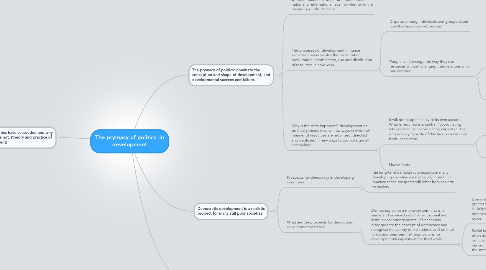
1. Why societies have succeeded and why other have not. (theory and practice of development)
2. The prymacy of politics: dominate the conception and shape of development, and developmental succees and failure.
2.1. Concept of politics: all te activities of conflict, cooperation and negociation involved in the use, production and distribution of resources, whether material or ideal, whether at local, national or international level, or whether in the private or public domains.
2.2. The processes of development in human societies always involve the organization, mobilization, combination, use and distribution of resources in new ways.
2.2.1. Disputes among individuals and groups about how this resources will be used.
2.2.2. People can´t change the way they use resourses without changing their relations with one another.
2.2.2.1. Key difference is that in developed democratics societies, change has come to be institutionalizated through generally more consensual modes of democratic politics. (slower, more incremental, less politically expolosive than in developing sociaties)
2.2.2.2. In many developing societies, inequalities are normally far greater and change can therefore threaten some interests much more directly and dramatically.(esencial changes to promote pace and direction of development)
2.3. Why is the state important? development as political process involve new ways in which all manner of resources are mobilized, directed and deployed in new ways to promote growth and welfare.
2.3.1. it will not happen solely of its own accord. What is required is a central "coordinating intelligence" or "coordinating capacity". The only agency capable of this task on a national basis is the state.
2.3.1.1. State: it is one that has the authorithy, power and capacity to work through, in and with a market economy or, in other words, one that is able to "manege the market". (developmental states) (Institutions can be integrated of processes)
2.3.1.2. No set of institutions and no code of governance is stronger than the sctructure of politics that both institutes and sustains it.
2.3.2. Nuevo nodo
3. Democratic development is a realistic propect for many still poor societies.
3.1. Prospects for democracy in developing countries?
3.1.1. the long-term democratic prospects in many developing societies are not good, though in practice these prospects will differ from socierty to society.
3.2. What are the prospects for democratic developmental states?
3.2.1. Democracy is not a mono-system; that is, a single and unvaried set of constitucional and institucional arrangements. It´s necessary disaggregate the concept of democracy and recognize the variety of institutional and political forms and then see their implications for developmental capacity in the third world.
3.2.1.1. Dominant-party democracy is likely to be greater then thet in a coalitional democracy an is likely to be much greater still than that in democracies where political paries alternate in power.
3.2.1.2. Social factor shaping the political forces are often decisive influences on the institutional and political form that democracy may take and hence the particular developmental capacity of the state.
